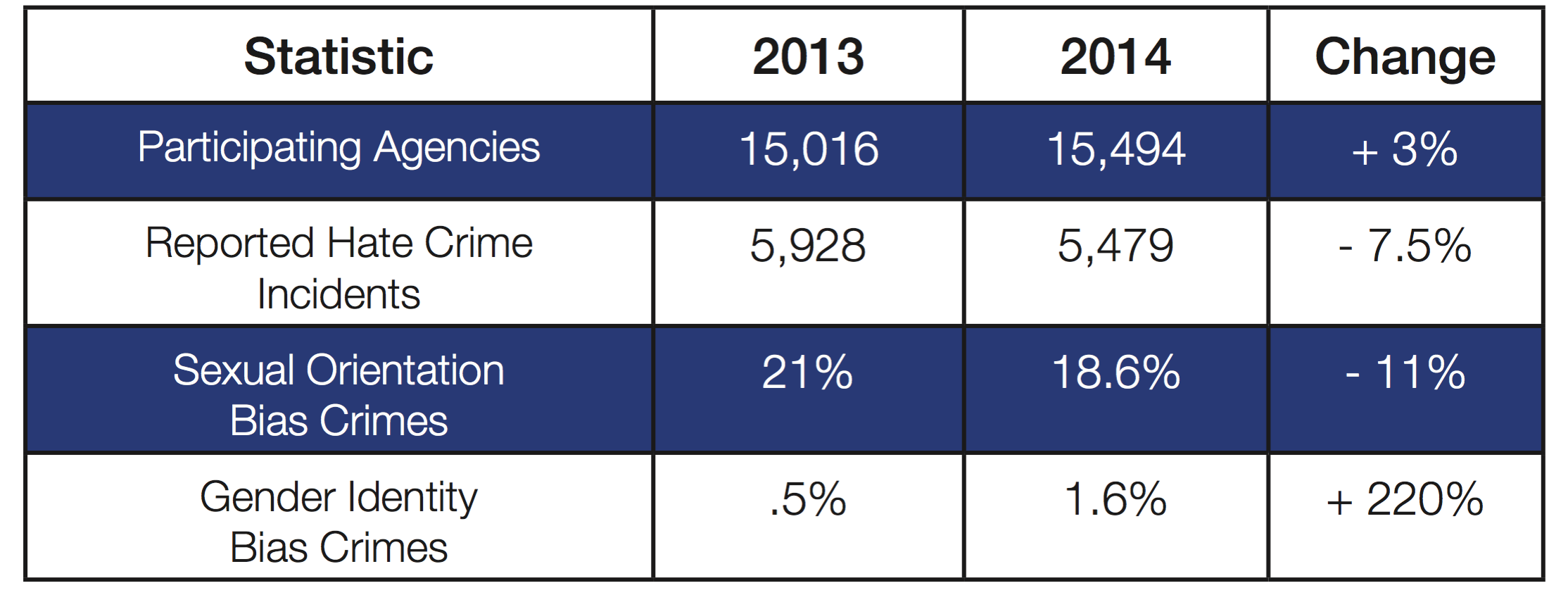The 2014 hate crimes statistics, released this morning by the Federal Bureau of Investigation, show small signs of improvement with a slight uptick in the number of participating law enforcement agencies and fewer reported incidents of hate crimes. But while reporting remains voluntary and with many cities with populations over 100,000 consistently reporting zero each year, the ability to properly document and address the issues surrounding hate crimes remains difficult.
For all of 2014 there were 5,479 hate crimes incidents reported, roughly 450 fewer than the previous year. Of the almost 19,000 law enforcement agencies in the country, 15,494 participated in hate crimes reporting, a 3% increase from 2013.
“It is encouraging to see a few hundred more law enforcement agencies participating in the reporting of hate crimes this year and a small drop in the number of hate crimes reported overall,” said Judy Shepard, president and co-founder of the Matthew Shepard Foundation. The Matthew Shepard James Byrd Jr Hate Crimes Prevention Act, signed into law in 2009, is named in part after her son who was murdered in an anti-gay hate crime in 1998. It added sexual orientation, disability, gender identity and expression and the perception thereof, to the existing hate crime law.
“However, when more than 3,000 law enforcement agencies did not participate in hate crime incident reporting in 2014, that is a problem,” she continued. “Several departments that did file reports reported zero incidents across the board. I find that outcome difficult to believe. In urban areas of 100,000 people or more, it seems unlikely that there were zero hate crimes—or no reporting at all— which we’ve seen in Miami, Florida; Mobile, Alabama; and Tulsa, Oklahoma, since 2011.”
“There are many possible explanations for the lack of reports. From the victim’s perspective, there may be a reluctance to report a hate crime due to the fear of re-victimization from law enforcement or the public at large, a lack of trust in the legal system, fear of losing one’s job because they live in a state where one can still be fired for being gay, lesbian, bi-sexual or transgender, or retaliation from the perpetrator. From the point of view of law enforcement, there may be a lack of funding for training or departmental personnel support, no awareness of what a hate crime is, a lack of understanding about how important it is to have an accurate picture of where and why these crimes are occurring and who is it that is being targeted. Is the lack of participation institutional or personal choice?”
“We need the victims of these crimes to report to better trained law enforcement agencies that are supported and encouraged by a tougher federal effort to gather this information. If we’re ever going to prevent these crimes from occurring, we need the data to understand the issues and that needs to be our number one focus.”

